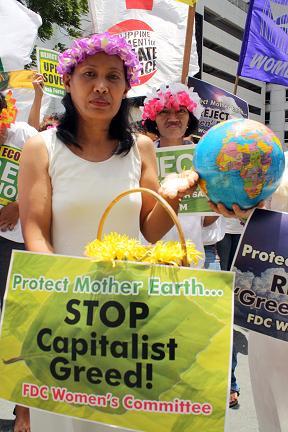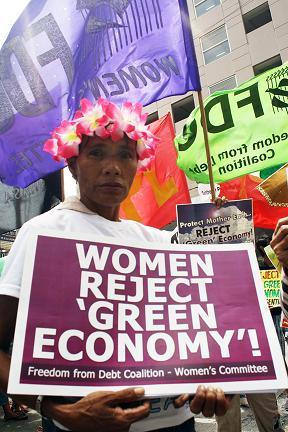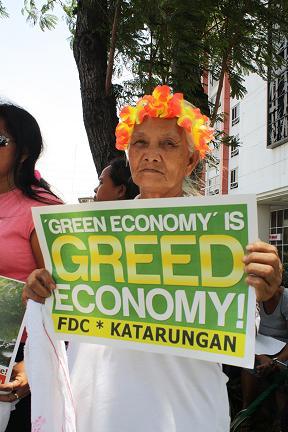

Groups urge world leaders to reject “Green Economy” in Rio+20 summit
Wanneer: 27/06/2012 - 14:23
MANILA, Philippines - Various cause-oriented groups warned the Philippine delegation and world leaders attending the three-day United Nations Conference on Sustainable Development (UNCSD) in Rio de Janeiro, Brazil not to fall into the trap of believing that the proposed "Green Economy" is "a tool and mechanism for sustainable development."



Around 150 activists belonging to Freedom from Debt Coalition (FDC), Philippine Movement for Climate Justice (PMCJ), FDC Women’s Committee, and Task Force Food Sovereignty (TFFS) trooped to the main office of National Economic and Development Authority (NEDA) and at the Philippine office of the United Nations as part of the Global Action Day for social and environmental justice, against the commodification of life and nature, and in defense of the commons.
The NEDA Director General is the concurrent chair of the Philippine Council for Sustainable Development (PCSD), and is leading the country's delegation to the Rio+20 Conference. PCSD members include heads the Department of Environment and Natural Resources (DENR), the Department of Foreign Affairs (DFA), the Department of the Interior and Local Government (DILG), the Climate Change Commission (CCC), and representatives from civil society organizations.
Ricardo Reyes, FDC president, said their biggest concern in Rio+20 summit is the "Green Economy" agenda being pushed by the United States and its allied North or rich, industrialized countries.
Reyes explained that on the surface, "Green Economy" sounds environment-friendly, especially if it is described as the "new rallying point for the better integration of the three pillars of sustainable development," namely environmental protection, economic development and social development.
"However, as we go deeper, the substance and implications of this US, et al devise will result in the exact opposite of the principles and objectives of the Earth Summit in 1992. This 'Green Economy' is greed economy," Reyes said.
"First, this 'Green Economy' concept pulls out the green, the environment, from sustainable development which includes the reform of production and consumption patterns through equitable international relations between the North and the South and social and gender equality in national societies – the mandate of UNCED," said Reyes.
"Second, ripped from sustainable development where it should be embedded, the 'Green Economy' is reduced to technological innovation as the solution to the environmental crisis. The development of renewable energies and the reduction of resource use are pushed aside in favor of the 'resource efficiency' of centralized, corporate forms of energy production and supply. The entry of the private, corporate sector is now assured," he added.
According to FDC, environment and climate change are now seen as new channels for renewed capital accumulation by the leading capitalist economies and states in the face of the continuing failure of global capital to recover from the economic crisis now gripping the capitalist world.
"And third, the 'Green Economy' is pushing an idea that is far more dangerous and disempowering to humankind: nature as capital," Reyes stressed.
Last Saturday, more than 35 financial institutions launched the Natural Capital Declaration to demonstrate their planet-saving intentions and to "work towards integrating Natural Capital considerations into our financial products and services for the 21st century."
"For us, this is the height of greed of the financial sector and capitalists. We will not allow Mother Nature to have a price tag. We will not allow the commons or traditionally shared resources to be allowed in the hands of few profit-driven corporations," said Reyes.
FDC explained that putting monetary value on nature means elements, like forests and their carbon sinks capacities are commodified. Nature becomes "resources" upon which property rights are established. The trading of "carbon credits" in the "carbon markets" which makes the polluters compensate for their emissions is one of the many reasons why activists are against treating nature as capital.
According to PMCJ, carbon markets are now looking at forest to create "carbon credits" by valuating the function of trees forest to sequester carbon emissions. Mechanisms such as Reducing Emission through Deforestation and Forest Degradation (REDD) promotes this new form of valuating of forests, hence commodifying the function of natural resources while promoting carbon offsetting. With market-based instruments and mechanisms, rich, industrialized nations continue their "business as usual" operations.
"Instead of drastically cutting their domestic emissions, rich countries buy carbon credits of developing countries to offset their continued levels of emissions. This must stop," said PMCJ.
Aside from commodification, FDC's Reyes expressed fear that the framework will also raise the privatization and financialization of nature, and accelerate further the concentration of control over nature by economic and political global and national elites to higher levels. He added that the framework will deepen these processes and expand them to include all resources that are vital for survival, such as water, biodiversity, atmosphere, forests, lands, food, etc.
"Once these natural resources are treated as economic goods – meaning they are owned privately, commodified and traded – the already highly inequitable and undemocratic structure, where a few control a vast portion of natural, economic and financial resources, will linger. Those who are poor will remain poor. Those who are marginalized will remain marginalized," Reyes stressed.
FDC Women's Committee also called for the rejection of the "Green Economy."
"Two decades after the Earth Summit, we are in worst crisis than before and in deeper level of impoverishment and deprivation, inequity and injustice. It is appalling though that even in the face of these environmental and development crisis, big business, Northern governments continue to protect their own commercial and business interests and green wash their capital accumulation. The documents that are also being put forward in the Rio+20 also ignores women’s rights, principles of meaningful participation and gender equality; even if these have long been affirmed in various international and local conventions and treaties such as the CEDAW and its optional protocol, Beijing Platform for Action, and the Philippines' Magna Carta of Women," said Marion Cabrera of the FDC Women's Committee.
Arze Glipo, TFFS lead convenor, also urged the Rio+20 delegates to uphold food sovereignty and the right to adequate food and water for life as requisites to achieving sustainable development.
Glipo explained that in agriculture, the current system has led to the expansion of agribusiness that has taken over and controlled production, market and distribution of agriculture products, resulting in the massive violation of food sovereignty and the rights of small-scale farmers, indigenous peoples, artisanal fishers and especially women.
She added that large-scale and intensive agricultural production by transnational agribusiness has produced severe social injustice and ecosystem degradation, and is a major contributor to climate change while failing to solve the problem of global hunger.
"Clearly, without addressing the fundamental flaws of the system, the commitments in Rio+20 through the 'Green Economy' strategy may end up exacerbating the current crisis and allow big business to plunder more the earth’s resources and create increasing profits, and often at the expense of the poor and hungry," said Glipo.
